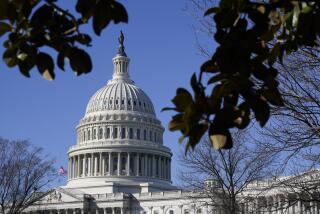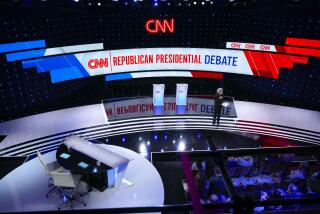Alaska Senate race becomes most expensive campaign in state’s history
The local official introducing the candidate eventually got around to the point — Sen. Mark Begich, standing up for Alaskans, get out the vote — but first he lit into the Koch brothers and what he described as money’s power to warp politics.
“They’re literally spending hundreds of millions of dollars to defeat Sen. Begich,” fumed Bill Wielechowski, a state senator who represents a swath of Alaska’s biggest city. “Why do these billionaires want to defeat Sen. Begich? They want to fundamentally change our government. ... Don’t be mistaken. The fate of the U.S. Senate is in your hands.”
When Begich took the microphone, he could only shake his head and smile. “That was my speech you just did,” said the Democrat, who is trying to keep his job in a tight and closely watched race against Republican Dan Sullivan.
Wielechowski only got it partly right about what has emerged as the most expensive political campaign in Alaska history. Tens of millions of dollars in outside money from across the country have flowed into the Last Frontier to unseat Begich. But even more has been spent to help the Democrat fend off his opponent.
As of early Thursday morning, $22.5 million in outside money — from groups or individuals not affiliated with the official campaign — has been spent on Begich’s behalf, while $16.7 million has been spent to help get Sullivan elected, according to the nonpartisan Center for Responsive Politics. The totals rise from hour to hour.
In pure dollars of outside spending, that makes the Alaska Senate race the fourth most expensive in the country, after North Carolina, Colorado and Iowa. But the $39 million has been used to sway a mere 500,000 or so voters, making the battle between Begich and Sullivan the priciest per capita this election season.
Money from “super PACs,” such as Karl Rove’s American Crossroads and Harry Reid’s Senate Majority PAC, has a double taint in America’s vast and sparsely populated 49th state.
It is outside money in the traditional sense, which is railed against by Begich and Sullivan alike. In addition, it is largely Outside money with a capital “O” — Alaskans’ favorite term of derision for all things Lower 48.
“It’s like these people aren’t from this state,” rued Jerry Barth, who isn’t from this state either but has lived here for 50 of his 67 years and occupied a folding chair at the Begich town hall meeting.
“What’s going to happen to our democracy in this country, the way that big money runs it already?” asked Barth, who drives a water truck on Alaska’s oil-rich North Slope. “I think it’s a sad part that we have to have an election run this way, other people controlling the destiny of our state because they have the money and don’t even live here.”
Super PAC money has been such an issue here that at different times in their long campaigns Sullivan and Begich each challenged the other to sign a pledge to get rid of the outside largesse. Each disparaged the other’s effort as little more than a political stunt. Each, in recent interviews, said his opponent quickly refused to sign on.
How quickly?
“In one hour, bam!” Begich said of Sullivan.
“Within two hours!” Sullivan said of Begich.
Not surprisingly, each effort failed.
And the money keeps flowing. In a 24-hour period, from 5:45 a.m. Wednesday to 5:45 a.m. Thursday, outside groups spent about $850,000 on the Begich-Sullivan race, according to opensecrets.org, the Center for Responsive Politics’ campaign money website.
Spending by Charles and David Koch — who are worth $42 billion each and tie for No. 6 on the Forbes list of wealthiest people in the world — is hard to track, because much of it is so-called dark money, meaning that donations and donors do not have to be disclosed.
Americans for Prosperity is financed in part by the Kochs, who back a host of conservative causes. It has spent about $192,000 fighting Begich and set up an office in downtown Anchorage.
The Kochs are the focus of ire in Alaska, and rampant rhetoric in the Begich-Sullivan race, because Koch Industries owns a company called Flint Hills Resources, which announced in February that it was closing its North Pole refinery. The move cost the state 80 jobs.
Easier to track is spending by Crossroads GPS, a nonprofit founded by Republican operative Rove, and American Crossroads, its related super PAC. As of Thursday, the groups have spent nearly $7.2 million to unseat Begich, making the Alaska Senate race their No. 2 target after the Senate race in Colorado.
On the other side is the Senate Majority PAC, which is closely allied with Senate Majority Leader Reid, the Democrat from Nevada. It has spent $8.8 million on the race, giving it to Put Alaska First PAC, a single-candidate super PAC in support of Begich. The Begich-Sullivan contest is Senate Majority PAC’s No. 2 target, after the Senate race in North Carolina.
The big bucks spent to sway Alaska’s small population show that “neither campaign has been perfect” when it comes to benefiting from outside money, said Jessie Peterson, director of the Alaska Public Interest Research Group. “They’ve both taken a lot of money.”
“It’s the voices of the individuals who lose out,” Peterson said. “When you donate $1 versus someone donating $1 million, it can’t help. The whole system needs to be reexamined.”
Twitter: @marialaganga
More to Read
Get the L.A. Times Politics newsletter
Deeply reported insights into legislation, politics and policy from Sacramento, Washington and beyond. In your inbox three times per week.
You may occasionally receive promotional content from the Los Angeles Times.







